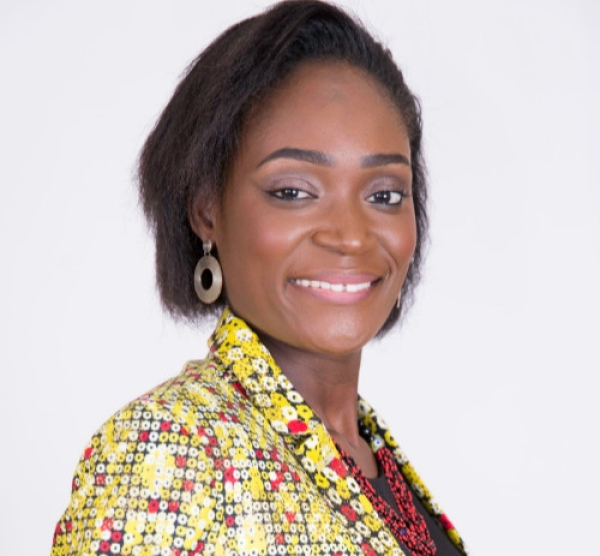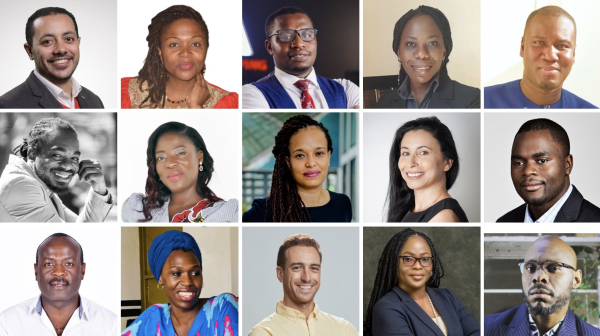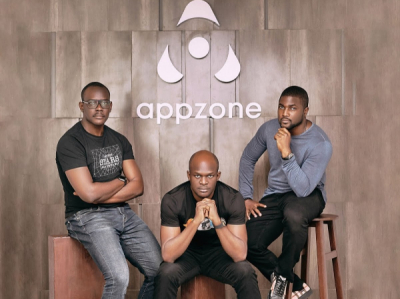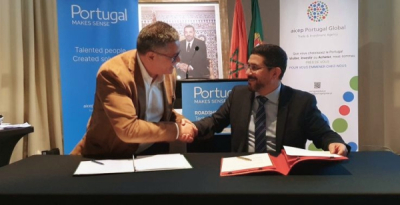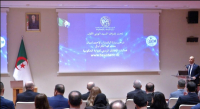After her computer science studies, she specialized in the agribusiness industry by helping rural women. Her social contribution and tech impact earned her several awards and recognitions.
Awa Caba (photo) is a Senegalese computer scientist and the co-founder/CEO of the e-commerce platform Soreetul.
In Wolof -the most-spoken language in Senegal, Soreetul means “it is no longer far” according to a dissertation by Senegalese Dphil Layire Diop. The digital platform created by Awa Caba facilitates the marketing and distribution of agricultural products processed by women in Senegal. Founded in 2013 -2014 according to other sources, it connects rural farmers, women notably, with buyers in urban areas.
In 2015, explaining what prompted her to launch Soreetul, Awa indicated that it was founded because the co-founders noticed that local products were seldom found in large stores or neighboring shops while women who process such products had no access to markets because they live in remote areas.
Apart from Soreetul, Awa Caba has also co-founded Yeesal Agri Hub, an innovative entrepreneurship support institution specializing in agribusiness. In December 2022, the institution founded in 2016, was selected to be part of the Rural Impacting Entrepreneurship program developed by Small Foundation and Village Capital.
She also co-founded Jiggen Tech Hub, the first women-in-tech network in Senegal. Since 2013, she is the Co-founder and IT manager of the web and mobile app development startup Weltima. Her professional career began in 2012 as an IT engineer at Nelam Services. She worked as a consultant for International Fund for Agricultural Development in 2014, USAID-ERA (Education and Research in Agriculture) project from June to August 2017, and FAO from February to December 2017.
The Mandela Washington Fellow has received several awards and honors. In 2020, she won the African Women's Leadership Award. In 2018, she won the Bank of Africa's African Entrepreneurship Award. She was also cited by “Forbes Africa as one of the most promising entrepreneurs under the age of 30 in Africa.”
Melchior Koba
The program aims to finance the development of African tech ecosystems.
Last Tuesday, Digital Africa announced its first 15 “Connectors" (leaders who will collaborate with Digital Africa for the development of local and regional tech and entrepreneurial ecosystems).
In a release accessed by We Are Tech Africa, Digital Africa explains that the 15 leaders will help find customized solutions to community challenges and generate effective opportunities. “Africa needs African-designed solutions to the continent's structural and infrastructural problems, be it in health, sports, energy, agriculture and we believe that it is in the made-in-Africa tech that can do it,” explains Aphrodice Mutangana, director of partnerships at Digital Africa.
A few months ago, Digital Africa launched a call for applications for its "Connectors Digital Africa" program. At the end of the selections, fifteen high-level African personalities were chosen, with three connectors per region: North Africa, South Africa, West Africa, East Africa, and Central Africa. They were selected based on their professional experience, and their strong sense of leadership, but especially for their commitment to having a positive impact on the African tech ecosystem.
Their missions will include acting as ambassadors representing Digital Africa in the region and providing a link between their community and Digital Africa, organizing activities and events on behalf of Digital Africa, identifying and mobilizing resources, and helping to map the ecosystem and suggest solutions.
"Connectors" is one of several initiatives launched by Digital Africa since its inception in 2018. In October, the pan-African initiative launched "Fuzé", a program that aims to provide a solution to the financing problems faced by African startups.
Samira Njoya
The solution is the successor of the proprietary solution AppZone. Its stated mission is "to connect every monetary store of value using blockchain."
Zone is a fintech solution developed by the Nigerian start-up Appzone Group. As the successor of the startup’s fintech solution Appzone, it “allows participating institutions to connect directly with each other and perform payment transactions without an intermediary while completely automating settlement, reconciliation, and dispute management.”
The solution is a regulated Blockchain network that enables payments and acceptance of digital currencies. According to the startup, its Layer-1 blockchain network guarantees 100% transaction success for payments made in fiat currency or digital currencies. In addition, it guarantees frictionless transactions and universal interoperability. As the platform says, "the network ensures that end-users interact in an easy and natural way and that service providers don’t need to make any extra effort to support payment functionality."
Zone also “supports integration to all systems that store monetary value and all touchpoints used to initiate payments.” To make the system more efficient, it provides simple and effective programming interfaces that can be used multiple times for different payment transactions.
In early 2021, to support the expansion of its technology, AppZone raised US$10 million in Series A financing. “As Appzone, we launched the first core banking and omnichannel software on the cloud as well as the first multi-bank direct debit service based on single global mandates. With this transition to Zone, we are utilizing the power of blockchain technology to connect every monetary store of value and enable reliable, frictionless, and universally interoperable payments,” says Obi Emeratom (photo, center), Co-founder and CEO of AppZone.
Adoni Conrad Quenum
He began his career providing tech assistance for educational projects and programs. For over 10 years, through BongoHive, he has worked with entrepreneurs and development partners to foster youth entrepreneurship.
Lukonga Lindunda (photo) is a Zambian start-up ecosystem builder and the co-founder/CEO of BongoHive Technology and Innovation Hub, Zambia’s first tech innovation center.
Thanks to the innovation hub, he supports the startup ecosystem by improving leadership skills, accelerating their growth, strengthening networks, increasing collaboration, providing a forum for the exchange of ideas, and reducing barriers to entrepreneurship.
Since its inception, BongoHive has hosted over 500 events, supported over 2,000 businesses, and benefited more than 9,500 people. In December 2022, it was selected to participate in Small Foundation and Village Capital’s Rural Impacting Entrepreneurship research project.
In 2015, its CEO and co-founder also co-founded BongoHive Consult, a consulting firm that helps businesses meet their clients’ current and future needs. In 2019, he also co-founded Hive Coworking, which provides coworking space for entrepreneurs and startups.
Since 2021, he is a non-executive director of the fintech company Digital Shared Services Ltd. Months earlier, he became the chairperson of the non-profit financial organization FSD Zambia’s Program Investment Committee (PIC). Since June 2020, he is also the non-executive director and vice chairman of Client Care Solutions Limited, a business process outsourcing company.
The serial entrepreneur entered the professional world in 2008 working for the non-profit organization Education Development Center as an IT and communication coordinator. The following year, he became the ICT technical assistant of the non-profit organization VVOB - education for development.
From 2010 to 2012, he was successively Junior ICT Advisor and ICT Program Advisor of VVOB. Between March 2021 and August 2022, he was an independent advisor to the Technology, Service Delivery, and Innovation Committee of the Zambia National Commercial Bank (Zanaco) Board of Directors.
A Mandela Washington Fellow in 2014, Lukonga Lindunda received the Nelson Mandela University Alumni Award in 2017 for his impact on society with BongoHive. In 2020, he received the ALUSB MBA Chairman's Scholarship, which celebrates African business leaders who have proven themselves as leaders both in the workplace and in the community.
Melchior Koba
In recent years, Morocco has built a number of partnerships to develop its digital sector. Last October, the government announced international partnerships that would help create more than 14,000 direct digital jobs in the country.
On December 6-9, 2022, Morocco hosted a mission of Portuguese tech entrepreneurs in partnership with several digital actors, namely the Agency for Investment and Foreign Trade of Portugal (AICEP Portugal Global), the National Association of Young Entrepreneurs (ANJE), the Confederation of Enterprises of Portugal (CIP) and the Association of Companies for a Network of Innovation of Aveiro (INOVA-RIA).
The mission aimed to present the current potential of the Portuguese technology ecosystem, identify business opportunities and establish partnerships with Moroccan tech companies.
During the 4-day visit, participants took part in B2B meetings in Casablanca. In Rabat, they also participated in a forum with the Moroccan public administration and local entities that have digital projects. Through that visit, the Portuguese tech entrepreneurs wanted to present themselves as privileged partners in the Moroccan ICGT industry and consolidate the relationship between the two countries’ digital actors.
Portugal is among the most business-friendly, stable, and open countries in the European Union in terms of innovation, digitization, and technical expertise. It is currently the 7th most advanced country in Europe according to the "Digitization in Europe 2020-2021" report. According to the World Economic Forum's Global Competitiveness Report 2020, it is the 6th best-prepared country in the world for the energy and digital transition, enabling a greener and more inclusive economy.
Thanks to the envisaged partnerships, Morocco will be able to take advantage of Portugal’s skills and experience to effectively implement the numerous projects planned in its digital strategy. In the Maghreb, Morocco is one of the pioneers of digital transformation. In 2005, the country started implementing digital strategies, including the "e-Morocco 2010" strategy, followed by the "Digital Morocco 2013" plan, "Digital Morocco 2020" and "Horizon 2025". In 2020, it was ranked fourth in the MENA "Digital Risers" (ranking of countries in terms of digital competitiveness).
Samira Njoya
Changing processes, management procedures, and interfaces called for by the ongoing digital transformation require investments, which most small businesses can not afford. The partnership aims to help in that regard and support small businesses through various means.
Pan-African fintech MFS Africa and the International Trade Centre (ITC) recently signed a partnership agreement to accelerate the digitalization of African markets.
According to a release issued by the ITC last Friday, the two “entities will support businesses in more than 10 African markets (Benin, Côte d’Ivoire, Ethiopia, Ghana, Mali, Rwanda, Senegal, Uganda, Tanzania, Zambia) through product integration, capacity building in fintech and digital payments, exposure to investment and business-to-business meetings.”
“With this partnership, ITC will strengthen its commitment to support small businesses in accessing financing and in digitalization and jointly tackle SDG 8 (Decent Work and Economic Growth). This partnership is the next step into ITC’s ambition to collaborate with the private sector to scale solutions supporting small business,” said Robert Skidmore, Chief of Sector and Enterprise Competitiveness at the International Trade Centre.
According to the LSEG Africa Advisory Group's 2018 report, "The challenges and opportunities of SME financing in Africa," SMEs are crucial for job creation and economic growth in Africa. In Africa, they account for about 90 percent of established businesses, create between 60 percent and 80 percent of jobs, and contribute 40 percent of GDP. In comparison, SMEs in the United States and Europe represent 53% and 65% of established businesses respectively.
Through this partnership, ITC and MFS Africa will help put small businesses at the heart of financial inclusion and digitalization. The partnership marks an important step in contributing to the United Nations 2030 Agenda for Sustainable Development. It will "build a new era where small business is at the heart of economic growth for the benefit of millions of African citizens," according to Ali Ouedraogo, head of expansion at MFS Africa.
Samira Njoya
The solution capitalizes on the free-movement-agreement between West African countries to easily move goods across the sub-region, facilitating transport and logistics operations for whosoever needs such services.
Anaxar is a digital platform developed by a Togolese eponymous start-up, founded in 2020. It helps users easily transport goods across West Africa. In fact, it connects freight owners, truck owners, and freight recipients.
Using its platform, users can request free quotes by filling out a dedicated form and providing information such as the nature of the goods, the weight, and the departure and arrival areas. Once the form is submitted, the startup gets in touch to evaluate needs and provide personalized and the most competitive quotes. When the user accepts the quote, he/she needs to validate it to get the goods transported to the desired location.
Let’s note that once the goods arrive at the stated location, the startup once again contacts the user to notify it. Apart from transporting goods, Anaxar also specializes in removal and delivery. It is present in all the West African countries with a network of over 1,000 professional transporters. It claims competitive prices and points out that its priority is customer satisfaction, with the goal of becoming the leader in the sector.
Adoni Conrad Quenum
Through Snode Technologies, the experienced cybersecurity consultant has developed several cybersecurity tools, receiving international honors and awards.
Nithen Naidoo (photo) is a South African computer scientist who graduated from the University of Pretoria in 2002. He is the founder and CEO of computer security and networking company Snode Technologies, based in Johannesburg, South Africa.
Snode Technologies -founded in 2016- is a cloud-based cybersecurity platform. Its algorithms process dynamic data -audio, video, and text- in real-time to help analysts identify behavioral trends, anomalies, and patterns that were previously impossible to identify with the naked eye.
“Snode was created to gain insight into prevailing patterns, not visible to the human eye, allowing our users to identify attacks before they happen,” Nithen Naidoo said in 2021.
The said startup has more than 80 points of presence worldwide. It offers three services, namely Snode Guard, Snode Guardian, and Snode Panthera.
Snode Guard provides automatic protection against threats such as malware, ransomware, phishing, and disinformation. Snode Guardian provides valuable information about cybersecurity risks or threats that may be prevalent in a said environment to prevent cyberattacks. Meanwhile, Snode Panthera disables attacks and defends vulnerable systems with its real-time automated response system.
Its founder is the winner of the 2019 MEST Africa Challenge. He is also the winner of the SA Innovation Summit 2020, the national finalist of the 2020 Entrepreneurship World Cup, and a finalist of the 2020 Pitch Live competition organized by Disrupt Africa and Africa Tech Summit. In 2021, he received the AfricArena Emerging Entrepreneur Award. His cybersecurity firm was selected among Slingshot 2020’s top 100 global deep tech startups. It was also a finalist for the AppsAfrica 2020 Innovation Award.
The honors and awards crown a professional career that started in 2003 when he joined Orange Cyberdefense as a penetration tester. From 2005 to 2007, he was a senior security consultant for Deloitte. In 2007, he joined the financial services firm Investec as a senior security analyst. Then, in 2009, Absa Group hired him as a senior security architect.
Melchior Koba
Information and communication technologies have proven their worth in improving efficiency and facilitating growth in various sectors. For that purpose, in a bid to leverage their power, Cameroon wants to up its investments in the sector.
Last Tuesday, Cameroonian President Paul Biya (photo) signed a decree empowering the Minister of Economy to ink a EUR84.1 million loan agreement with the International Development Association (IDA). The funds thus secured aim to finance PATNuC, a project to accelerate digital transformation in the country.
According to the Ministry of Posts and Telecommunications (Minpostel), the project being implemented since 2021 aims to pursue ICT reforms and policies, improve citizens’ digital skills, encourage the development of digital apps and services and increase the reach and use of digital services to boost employment and entrepreneurship in Cameroon.
PATNuC has three main companies. The first is the establishment of new institutional, legal and regulatory frameworks conducive to the growth of the digital sector, the enhancement of digital trust, the creation of digital platforms, and the acquisition of relevant equipment for the secure and resilient development of digital services in Cameroon.
The second component focuses on stimulating the local market by facilitating Internet access and the inclusive use of ICTs for the development of the country’s economic fabric. "Its specific objective is to promote the expansion of digital networks in rural areas by focusing on underserved areas to improve mobile broadband services in those areas. It will do so mainly through public-private partnerships (PPPs)," explains the Ministry of Posts and Telecommunications.
The last component focuses on strengthening disruptive agricultural technologies (DAT) to improve market linkages and value addition in targeted rural communities.
S.A.
E-governance is one of the priorities of the Algerian government. The choice aims to promote economic growth and improve employment and living standards.
Last Wednesday, Algeria launched its e-governance platform featuring over 300 digitized public services offered by various ministries. The platform allows citizens access to the services and detailed information on administrative procedures.
According to Prime Minister Aïmene Benabderrahmane, the platform plays a “vital role in promoting unified access to digital services, which spares citizens the burden of wasting their time searching for digital public services and checking official sites and sectoral portals.”
Since 2020, Algeria has made notable progress, establishing a solid foundation for its effective digital transformation. According to the UN E-Government Survey 2022, Algeria ranks 112th out of the 193 countries surveyed in the report. It also has a high e-governance index and is among Africa’s top 16 in that index.
The unified e-government platform is part of the national strategy for an efficient digital transformation. For Minister Aïmene Benabderrahmane, it is an important milestone in the implementation of the country’s program to achieve digital transformation, promote the widespread use of ICT tools and improve economic governance.
Samira Njoya
More...
The solution is unveiled after more than ten months of testing. It allows millions of Kenyans access to various stock markets and information to up their investment skills.
Hisa is a fintech solution developed by a Kenyan eponymous start-up. It enables users (individuals and businesses alike) to buy fractional Kenyan and US stocks and pay via mobile money.
“At Hisa, we are building the infrastructure for borderless investments in Africa through micro-investments. Less than one percent of the population in Sub-Saharan Africa invests in the capital markets, caused mainly by a lack of access, low financial literacy levels, lack of IPOs as well as low liquidity of the local stock exchanges. [...] Through Hisa, anyone in Kenya can invest in their favorite companies such as Safaricom, KCB, Equity, Tesla, Apple, Microsoft, and many more,” explains Erick Asuma, Hisa’s co-founder, and CEO.
The solution was launched after ten months of beta testing. It has a mobile app -for both Android and iOS devices, through which users can create their accounts to access its numerous features. Among other things, they can access over 400 podcasts about the stock market, technologies, and asset management.
According to Eric Jackson, another Hisa co-founder, the startup is planning a funding round to expand its operations. The co-founder says the fintech already has more than 15,000 users with more than US$1 million in transactions processed. On Playstore, the Hisa Android app has already been downloaded more than 10,000 times. Its rating is 2.8 out of 5.
Adoni Conrad Quenum
The serial entrepreneur runs several businesses in the USA and Côte d’Ivoire. With Seekewa, his latest venture, he wants to build a new food system in Africa.
Fred Zamblé (photo) is an Ivorian entrepreneur. He is also the co-founder and CEO of Seekewa, a startup he launched in 2016 with his brother Serge. With Seekewa, he wants to improve the food supply while at the same time ensuring smallholder farmers have better incomes. Indeed, on its online platform, Seekewa brings together organizations and individuals (known as supporters), and farmers with small projects. The “supporters” can support projects presented by farmers by purchasing redeemable e-vouchers that give them discounts on food products.
“We propose a socio-economic model based on the direct relationship between consumers and farmers. The commitment on the platform is free of charge for the contributors and the farmers. Seekewa addresses both the living conditions of farmers in rural areas and the improvement of the purchasing power of the lower and middle classes through a circular economy,” Fred told Disrupt Africa in 2019.
Apart from Seekewa, the former MEST Africa Challenge participant also co-founded, in 2014, Digicraft LLC, a Delaware-based company he heads as the CEO. From 2015 to date, he is a photo evangelist for Fotowalk City in Côte d’Ivoire. In 2005, he co-founded the digital agency Neuropixels Inc., where he is serving as the CEO. A year earlier, he entered the professional world as a UX developer and designer at Atemis Business Cloud, a US software development company. From 2016 to 2014, he was an Adobe West Africa user group manager.
Melchior Koba
Since its launch in 2016, Mpoto, the startup behind Coneckto Food, has developed several interesting solutions in the Burkinabe market. The latest allows users to order food.
Conekto Food is a mobile app developed by the Burkinabe start-up Mpoto. It allows its users to order food in Burkina Faso. It also gives users the possibility to get the food delivered when needed.
The app is available for iOS and Android devices. To access its services, users need to create an account. Then, they can access the menus offered by listed restaurants and place orders. When ordering, they can ask restaurants not to add so or so ingredients to their foods. They can also choose whether the foods need to be delivered or they will pick them up. For payment options, they can pay either with cash or by mobile money.
In 2021, Mpoto announced that Conekto Food was already downloaded more than 2,500 times. On Playstore, which is the official app store for Android devices, the app has been downloaded some 100 times.
Currently, the solution covers only Ouagadougou, Burkina Faso’s capital. It lists over twenty restaurants with hopes to conquer other towns and restaurants in the near future.
Adoni Conrad Quenum
After his mechatronics and robotics studies in the UK, he went back to Mali, his home country, to vulgarize the then-little-known mechatronics industry. The company he built for that purpose has been growing by the day since then.
Abdoulaye Diakité (photo) is a Malian mechatronics, robotics, and automation engineer who graduated from Kingston University in the UK in 2014. He is also the founder and CEO of Diakité Robotics Ltd, a robotics company founded in 2014.
Through that company, he offers robotics, mechatronics, electromechanical, smart security, and physical security solutions engineering services. He also develops solutions for home automation, metrology and rapid prototyping, and bust sculpting.
"Diakité Robotics is a mechatronics company created in 2014 to vulgarize mechatronics -which is the synergistic and systemic combination of mechanics, electronics, automation, and real-time computing- in Mali, but also in the entire sub-region," said Abdoulaye Diakité in an interview with maliweb.net in 2020.
During the Covid-19 pandemic, his company developed Sania Blon, an individual disinfection tunnel that emits a bactericidal and virucidal decontamination product. The solution helps disinfect passers-by without harming their health, their clothes, and their personal belongings. It was intended for use by the most-frequented companies and institutions like banks, hospitals, industries, and government institutions.
The CEO also plans to create the prototype of a submarine that can support the marine brigades operating across the Niger River. He is also designing an autonomous electric scooter and 3D-printed bionic hand and shin prostheses.
Before launching Diakité Robotics Ltd, from 2008 to late 2012, he worked for Malian firm Voice Communication SA, as a technical support engineer. In March 2022, he won the Best Young Entrepreneur Brand Award at the first Mali Brand Week. In 2014, he wrote the engineering paper “CAN Bus Based Systems Teaching Using Electronic Rapid Prototyping,” which was presented at the World Conference on Technological and Engineering Education (WCTEE) in Greece.
Melchior Koba


